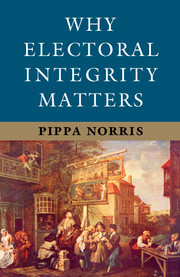Book contents
- Frontmatter
- Contents
- List of Figures
- List of Tables
- Preface and Acknowledgments
- Part I Introduction
- Part II The Problem of Flawed Elections
- 4 International Concern about Electoral Malpractices
- 5 Public Perceptions of Electoral Integrity
- Part III The Consequences of Electoral Integrity
- Part IV Conclusions
- Technical Appendix A: Description of Variables and Scale Construction
- Technical Appendix B: Questions in the Expert Survey of Perceptions of Electoral Integrity
- Technical Appendix C: Electoral Context and Background in the Selected Cases
- Notes
- Select Bibliography
- Index
5 - Public Perceptions of Electoral Integrity
Published online by Cambridge University Press: 05 July 2014
- Frontmatter
- Contents
- List of Figures
- List of Tables
- Preface and Acknowledgments
- Part I Introduction
- Part II The Problem of Flawed Elections
- 4 International Concern about Electoral Malpractices
- 5 Public Perceptions of Electoral Integrity
- Part III The Consequences of Electoral Integrity
- Part IV Conclusions
- Technical Appendix A: Description of Variables and Scale Construction
- Technical Appendix B: Questions in the Expert Survey of Perceptions of Electoral Integrity
- Technical Appendix C: Electoral Context and Background in the Selected Cases
- Notes
- Select Bibliography
- Index
Summary
Is the public aware of electoral malpractices? In particular – the key question addressed in this chapter – do ordinary citizens have informed and rational perceptions about problems of electoral integrity when they occur? The first proposition in the agenda-setting model theorizes that we should observe a link (depicted as H1) between the actual quality of elections in any country and public perceptions of electoral integrity and malpractices. Of course, even if mass perceptions are erroneous – for example, the opposition incorrectly claims that the official results are fraudulent or elections are stolen – they can still matter, potentially triggering street protests and even violent riots. And even if citizens lack firsthand information about clandestine or illicit electoral problems, they can still use heuristic cues such as media headlines to arrive at correct judgments about these practices. Nevertheless, in contrast to traditional views in social psychology, this study theorizes that the general public – individually and collectively – is capable of making fairly accurate assessments about the quality of elections occurring in their own country and that awareness is strengthened by access to the independent media, the cognitive skills and knowledge provided by formal education, and party leadership cues.
To establish this argument, the first part of this chapter sets out the long-standing theoretical debate concerning the public’s capacity for making informed political judgments; the second part considers the evidence. Most tests of political knowledge compare public opinions with factual textbook answers, such as correctly identifying the number of members of the U.S. Senate or the name of the UN Secretary General. It is less straightforward to establish a factual yardstick that is true or false when it comes to perceptions of electoral integrity. Was the media biased? Did money determine the outcome? Were the rules fair? There is no straightforward way to assess the truth or falsity of such claims. One way to test the core claims, however, is to see whether public perceptions of the quality of elections in their own country are congruent with independent assessments. To follow this strategy, the study examines mass perceptions of electoral integrity and malpractices, using cross-national survey evidence derived from many sources, including the sixth wave of the World Values Survey (WVS), conducted in a diverse range of countries.
- Type
- Chapter
- Information
- Why Electoral Integrity Matters , pp. 91 - 110Publisher: Cambridge University PressPrint publication year: 2014

